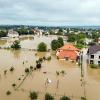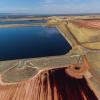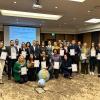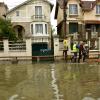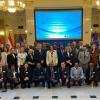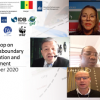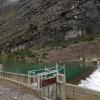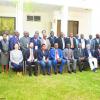News
Displaying Results 26 - 50 of 51
Almost all of Zambia’s territory sits within transboundary rivers basins, the Zambezi and Congo River Basins each covering approximately 75% and 25%, respectively, of Zambia’s territorial area.
In this context, Zambia has confirmed its intention to accelerate the accession process to the…
Water scarcity and pollution is increasing worldwide, as a result of the rising economic demands for water, population growth and rapid urbanisation, exacerbated by ecosystem losses and climate change. Water-related risks can negatively affect sustainable development, human health and well-being, …
Water, health, climate change and disaster risk reduction are interlinked and interdependent. For example, with climate change, floods and droughts increase in both intensity and frequency. Floods can damage water and sanitation infrastructure, disrupt essential public service provision, undermine…
Today marks the holding of the first meeting of the Working Group on Tailings Safety and the Prevention of Accidental Water Pollution (IIWG) in Kazakhstan – the first comprehensive dialogue on these issues between all relevant stakeholders and national authorities in the country.
After being…
Guaranteeing safe access to drinking water and sanitation remains a challenge in the pan-European region, with 16 million people still lacking access to basic drinking water services and over 29 million people not having access to basic sanitation, including hundreds of thousands who have to…
In the pan-European region, citizens are feeling the impacts of climate change through extreme weather events. This undermines equitable access to water and sanitation as human rights, due to increasing water scarcity and increased burden of water diseases due to overflow of untreated sewerage…
Accidental water pollution, which can be sudden and heavy as a result of industrial accidents, endangers people and the environment where chemical activities take place near a river, lake or water body. Accidental water pollution events can be triggered by natural hazards, such as floods, lightning…
Transboundary rivers, lakes, and aquifers play a vital role in supporting the livelihoods of billions of people worldwide. Roughly 60% of global freshwater flow is in shared basins. About 40% of the world’s population lives in shared basins. The development and management of transboundary water…
Joint efforts to harmonize data collection, strengthen monitoring and data exchange on water quality, develop early warning systems on water pollution at transboundary waters and improve collection and sharing of data on transboundary aquifers are needed for effective regional cooperation in…
“There is a not a single major global challenge that does not involve water. This includes migration, conflict, disease, hunger, gender equity, population growth, urbanization, and climate change”. These were the words of UN-Water Chair, Mr. Gilbert Houngbo, as governments and key stakeholders from…
Integrated management of water, energy and land resources, while protecting ecosystems, remains a substantial challenge in the Western Balkans. The Water-Food-Energy-Ecosystems (WEFE) Nexus approach offers solutions that can reconcile potentially conflicting interests as they compete for the same…
While transboundary rivers, lakes and aquifers, accounting for 60 per cent of global freshwater flows, are of crucial importance for the sustainable development and political stability of riparian States, the financial means for their management, development and protection are insufficient in most…
Prevention of and preparedness for industrial accidents require special attention in Tajikistan, a country with a strong mining industry. The mountainous terrain of mining sites makes them highly susceptible to earthquakes, mudflows and floods, which can provoke Natech events (natural hazards…
Industrial safety and the prevention of accidental water pollution were high on Kazakhstan’s agenda this week, with the Second Meeting of the Inter-institutional Working Group on Tailings Safety and the Prevention of Accidental Water Pollution (IIWG).
The meeting brought together more than 60…
Uzbekistan is one of the world's largest producers of gold and uranium. In the last 40 years, Uzbekistan has built a strong mining industry, which is expected to grow in the years to come, given that only 20 % of the country’s territory has yet been explored. The expected rise in the number and…
Experts from Albania and Montenegro met in Shkoder (Albania) on 25 April 2023 to progress with the exchange of information on the shared Cijevna/Cem River. This was the second meeting of the joint technical group on monitoring and assessment established upon recommendation of the Implementation…
Preventing accidental water pollution remains a key challenge for many countries within and beyond the UNECE region. Approximately 60% of the world’s freshwater flows occur in transboundary river basins where 40% of the world’s population live. Countries rely increasingly on transboundary water…
The Water Convention has facilitated the First round of Technical & Planning Negotiations of the Draft ‘Agreement on the Establishment of the Luapula River and Lake Mweru Authority between the Democratic Republic of Congo (DRC) and Zambia on 18 and 19 April, concerning the transboundary Lake…
Adapting to climate change and managing the risks of natural and technological hazards in transboundary basins has become critical, as the frequency and intensity of extreme weather events - such as floods, droughts, landslides or storms - are on the rise in the wake of the changing climate. Timely…
In the Drina River Basin, shared mainly by Bosnia and Herzegovina, Montenegro and Serbia, working together across borders and jointly addressing water and energy challenges is a key part of effective climate action and the green transition.
As part of the Sarajevo Energy and Climate Week (25-29…
A vision for transboundary cooperation around the Senegal-Mauritanian Aquifer Basin (SMAB) has been developed by representatives of the States that share this aquifer system, namely The Gambia, Guinea Bissau, Mauritania and Senegal.
This work was carried out in the second meeting of the…
With the UN Food Systems Summit taking place next week under the auspices of the UN General Assembly (23 September 2021), we must recognize that the food systems we have built over recent decades are unsustainable. The food choices we make every day as consumers and producers of food are having a…
COP26 was a positive step forward in the fight against climate change, but as the UN Secretary General pointed out in his comments: “it is not enough. We must accelerate climate action to keep alive the goal of limiting the global temperature rise to 1.5 degrees.” The compromise deal reflects the…
UNECE was engaged at the main global forum to assess and discuss progress in implementing the Sendai Framework for Disaster Risk Reduction (DRR) – the seventh session of the Global Platform for Disaster Risk Reduction (GP2022) held in Bali and online, 25-27 May 2022, fully embracing its theme: “…
This year, the UNECE region has seen devastating impacts of climate change and multiple natural disasters, such as the floods in Belgium, the Netherlands and Germany. Disasters caused by natural hazards, on the rise due to climate change, can also trigger technological accidents.
On today’s…




